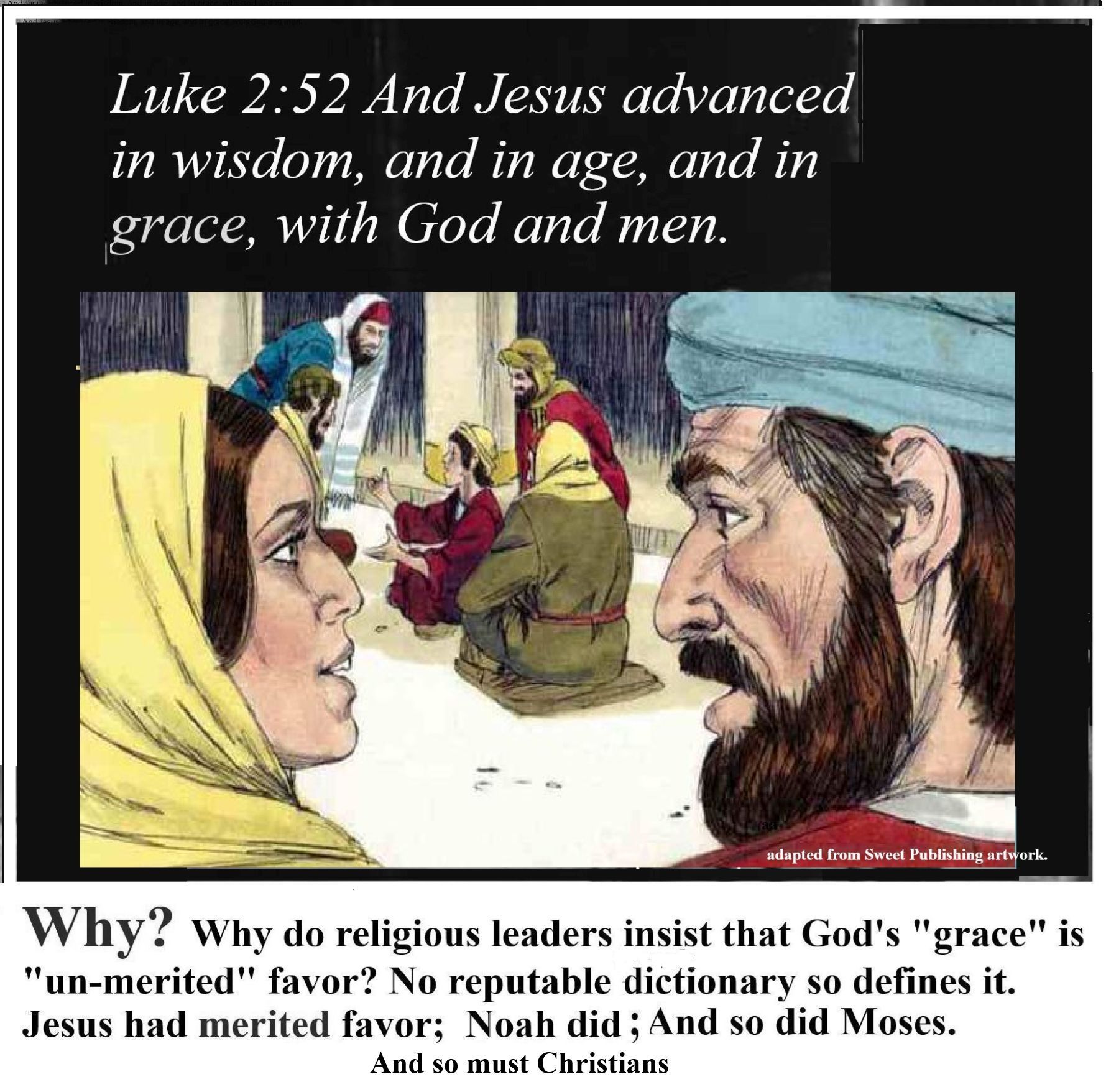
RETHINKING BIBLE TERMS
Once upon a Sunday morning, a denomination on the corner was singing “Amazing Grace” while at the other end of the block a congregation was singing “Trust and Obey For There's no other way.” Are these two songs contradictory to one another? Would it not depend upon the definition of “grace”? Could “grace” include “trust and obey”? Acturally, they are complementary Biblically but “grace” must be properly defined.
“Grace” is a fundamental term describing God’s dealings with His people. It affects the understanding of God's plan of salvation. Since the nineteen sixties, an erroneous definition of the Bible word “grace” has permeated the teachings in churches in America. “Unmerited” or “without works” has been added. But “grace” does not and cannot include “unmerited” contrary to this erroneous teaching.
According to Mikelson's Enhanced Strong's Dictionaries of the Greek and Hebrew Testaments, the English word “grace” translates the Greek original charis #G5485 which can be translated and defined as “graciousness” (gratifying), “influence upon heart”, “gratitude”, “benevolence”, and “influential favor.” But merit, or lack of merit, is never included in its definition.
Basic illustrations from all four Biblical dispensations destroy an universal use of tacking on of “unmerited” for grace's definition.
FIRST ILLUSTRATION IS NOAH.
Genesis 6:8, “Yet truly, Noah found grace [χάριν LXX, Greek translation of the Hebrew] before the Lord. 9 These are the generations of Noah: Noah was a just man and perfect in his generations, and Noah walked with God.”
Could the use of “grace” in the eyes of God for Noah include “unmerited.” No. He was “just”, “perfect” and “walked with God.” If not, then the definition was not universally applied.
SECOND ILLUSTRATION, MOSES.
Exodus 33:13, “Now therefore, I pray thee, if I have found grace [chen (Hebrew) χάριν, (Greek LXX)]in thy sight, shew me now thy way, that I may know thee, that I may find grace in thy sight: and consider that this nation is thy people. … 16 For wherein shall it be known here that I and thy people have found grace in thy sight? is it not in that thou goest with us? so shall we be separated, I and thy people, from all the people that are upon the face of the earth. 17 And the LORD said unto Moses, I will do this thing also that thou hast spoken: for thou hast found grace in my sight, and I know thee by name. 18 And he said, I beseech thee, shew me thy glory. 19 And he said, I will make all my goodness pass before thee, and I will proclaim the name of the LORD before thee; and will be gracious to whom I will be gracious, and will shew mercy on whom I will shew mercy.”
Considering Exodus 33. There, in the space of six verses, Moses is said to have found favor (grace) with God five times, i.e., chen [Hebrew] or χάριν [its Greek, ABP+] being translated either "find favor" or "be pleased with." At the beginning of the chapter, Moses requests that God teach him his ways, so that he may "know you and continue to find favor with you" (v. 13). God promises to go with Moses in the next verse because "I am pleased [chen (Hebrew) χάριν, (Greek LXX)] with you and I know you by name" (v. 17).
THIRD ILLUSTRATION, WITH JESUS
Luke 2:40 “Now the child grew, and he was strengthened with the fullness of wisdom. And the grace χάριν of God was in him.” Luke 2:52 “And Jesus advanced in wisdom, and in age, and in grace χάριν, with God and men.” Hebrew 4:15 “For we have not an high priest which cannot be touched with the feeling of our infirmities; but was in all points tempted like as we are, yet without sin.” Did Jesus need an “unmerited” favor χάριν from God?
Of course not. The word means “favor” without the restriction of an adjective “unmerited.” Jesus had favor from God and man while growing up..
FINALLY, FOURTH WITH THE SAVED.
Grace is associated through the faith (Jude 3) and is a result of keeping New Testament's commands. Ephesians 2:8, “For by grace you have been saved through the faith; and this matter is not of yourselves; it is the gift of God: 9 not by works, lest any one should boast.” (Anderson's). Grace through the faith “teaches” us what to do (Titus 2:11,13).
SALVATION is a judgment of one's obedient works. The final promise in Revelation 22:12, “Behold, I come quickly, and my reward is with me, to give to every one as his work shall be. 13 I am the Alpha and the Omega, the First and the Last, the Beginning and the End. 14 Blessed are those who do his commandments, that they may have right to the tree of life.” (Anderson's 1865 New Testament). Matthew 28:18-30 in the so called “great commission”, Jesus commands us to keep His commandments.
